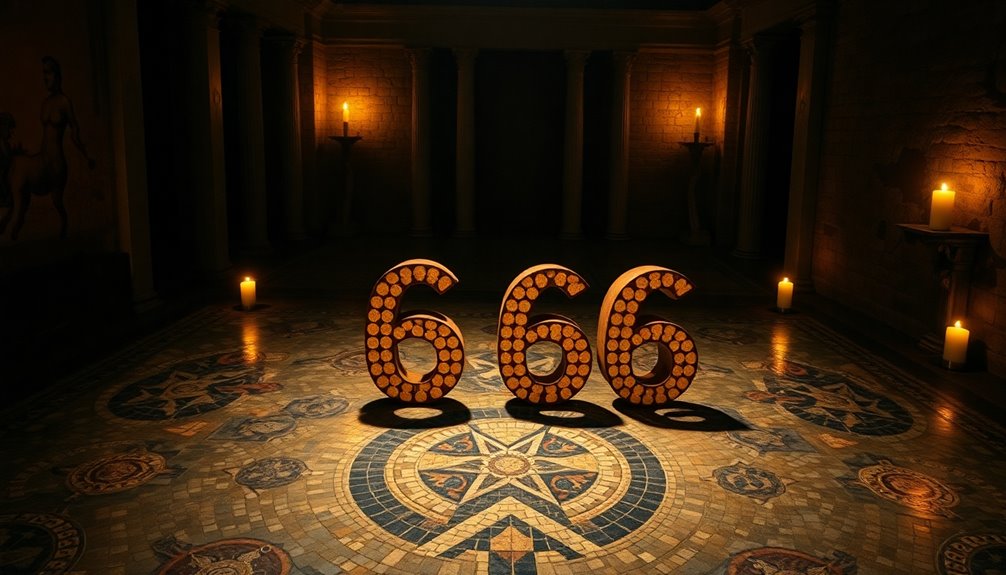You might think of 666 as just a relic of biblical prophecy, but it's much more relevant today. This number, often associated with moral decay and tyranny, warns against blind allegiance and challenges you to maintain your integrity in a world filled with oppressive influences. Historical figures tied to 666 reveal a pattern of societal control that echoes in modern times. It's not just about future Antichrists; it's about recognizing the traits of deception in leadership now. Staying aware of these implications can keep your faith strong amid challenges. Keep an eye on what's happening around you; the truth may surprise you.
Key Takeaways
- The number 666 symbolizes ultimate evil and serves as a timeless warning against moral decay and tyranny throughout history.
- Historical figures like Nero, Hitler, and Mussolini exemplify the oppressive nature associated with 666, raising concerns for modern leaders.
- The Mark of the Beast highlights the danger of economic and social control, urging believers to remain steadfast in their faith.
- Misunderstandings of 666 in popular culture often overlook its historical context, emphasizing the need for discernment in recognizing true idolatry.
- Ongoing global moral crises stimulate discussions about a modern-day Antichrist, making 666's implications increasingly relevant today.
Introduction

The number 666 often raises eyebrows and sparks curiosity, especially when you consider its biblical roots as the "mark of the Beast." This figure, mentioned in Revelation 13:18, symbolizes a profound allegiance to forces that stand in opposition to God.
Historically, it's linked to the Roman Empire and figures like Nero, whose reign from 54-68 AD epitomized the oppressive nature associated with the Beast. Nero's extreme persecution of Christians and enforced emperor worship created a chilling atmosphere for believers.
Throughout history, many leaders have been speculated to embody Antichrist traits, with notorious figures like Hitler and Mussolini often cited due to their tyrannical regimes. The concept of 666 continues to fuel theological debate, evolving from identifying the Pope as the Antichrist to considering various potential future candidates.
In today's world, global conditions and moral crises have some theologians believing we're inching closer to the emergence of a leader reminiscent of that biblical Beast.
As you delve deeper into the significance of 666, you may find yourself questioning how these historical and contemporary contexts intertwine, prompting a reevaluation of what this number truly represents.
Biblical References to 666

When you explore the Biblical references to 666, you'll find that Revelation 13:18 stands out as a key passage, directly linking the number to the Beast.
This connection not only highlights idolatry but also serves as a warning to those facing persecution.
Primary Bible References
Although many associate the number 666 with ominous connotations, its primary biblical reference comes from Revelation 13:18, where it's labeled as the "number of the beast." This passage not only identifies the number but also links it to a figure representing ultimate evil, often interpreted through the lens of gematria, a numerological system rooted in Jewish tradition.
In this context, 666 signifies a profound warning about idolatry and misguided allegiance. Revelation 13:17 further discusses the mark of the Beast, which is directly tied to 666, indicating a choice between loyalty to the Beast and fidelity to God. By accepting the mark, individuals demonstrate their allegiance to an entity that opposes divine authority, highlighting the stakes for believers during turbulent times.
Some scholars even suggest that 666 may refer to Emperor Nero when transliterated from Hebrew, emphasizing his brutal persecution of early Christians. This historical interpretation intensifies the urgency of the message, reminding you of the consequences of turning away from God.
In the grand narrative of Revelation, 666 serves as a critical marker, urging you to remain steadfast in your faith amidst trials and temptations.
Secondary Bible References
While often overshadowed by its primary mention in Revelation, the number 666 appears in various contexts throughout the Bible, reinforcing its significance. In Revelation 13:18, this number is labeled as the "number of the beast," calculated from the name of the beast, which signifies a troubling allegiance. Through gematria, a Jewish numerological system, you can interpret 666 as corresponding to "Nero Caesar" in Hebrew, linking it to a historical figure notorious for his persecution of Christians.
The concept of the "mark of the beast," associated with 666, symbolizes economic and social control, suggesting a future where you might've to choose between loyalty to God or the Beast. Revelation 14:9-11 warns against worshiping the beast or receiving its mark, emphasizing the eternal consequences of such actions.
Moreover, the number serves as a stark reminder against idolatry and false worship throughout scripture. It urges you to stay vigilant against deception and moral compromise in your faith.
Roman Empire's Numeric Symbolism

The Roman Empire's numeric symbolism reveals profound insights into its culture and beliefs. When you consider the number 666, often linked to the Beast in Revelation, it symbolizes imperfection and incompleteness—an intentional contrast to the biblical perfection represented by the number seven.
In the Roman context, gematria plays a vital role, as letters are assigned numeric values. This practice allows "Nero Caesar" to total 666 in Hebrew, firmly connecting the infamous emperor to this ominous number.
Moreover, the seven heads of the Beast are frequently interpreted as the seven hills of Rome, highlighting the political power concentrated in the empire. The ten horns of the Beast signify ten kings or kingdoms, pointing to the fragmented authority that emerged as Rome declined.
Additionally, the mark of 666 isn't just a number; it signifies economic control, demanding allegiance to the Beast. This reflects the oppressive systems of the Roman Empire that enforced emperor worship and loyalty.
Understanding this numeric symbolism deepens your appreciation for how the empire wielded power and influenced beliefs, laying the groundwork for the complex interpretations of 666 that linger today.
Numerology in Ancient Texts

Understanding the Roman Empire's numeric symbolism opens the door to a broader exploration of numerology in ancient texts. You'll find that numbers often carried profound meanings, used not just for counting but to communicate deeper concepts.
The number 666, known as the "number of the Beast," exemplifies this practice, rooted in the Greek word for "beast" and linked to gematria. Here, letters correspond to numerical values, particularly in Hebrew and Greek, enhancing the richness of biblical interpretation.
In Revelation 13:18, 666 symbolizes imperfection, a stark contrast to the divine completeness represented by the number seven. This number connects to historical figures like the Roman Emperor Nero, whose name, through gematria, totals 666, positioning him as a prototype of the Antichrist.
You'll notice that ancient texts frequently used numerology to convey hidden meanings, with numbers like 12 representing completeness and 40 symbolizing testing.
Misunderstanding 666's Significance

You might be surprised to learn how often 666 is misunderstood in popular culture.
Many misconceptions overshadow its true biblical context, leading to unnecessary fear and skepticism about its significance.
Debunk Common Misconceptions
Amidst the swirl of conspiracy theories and apocalyptic predictions, many misconceptions about 666 cloud its true significance. Often labeled the "number of the Beast," it actually symbolizes allegiance and worship to the Beast mentioned in Revelation 13:18. This isn't a literal identifier of individuals but a warning against idolatry, particularly relevant during the persecution of early Christians.
You might think 666 points exclusively to a future Antichrist, but historical interpretations suggest it may represent the Roman Emperor Nero through gematria, where his name's numerical values align with this infamous number. Many modern interpretations misidentify various figures as the Antichrist, driven more by cultural fears than by clear prophetic fulfillment.
It's crucial to recognize that the essence of 666 isn't just about pinpointing a future villain. Instead, it serves as a timeless caution against moral decay and tyranny throughout history.
By understanding this context, you can appreciate that 666 is less about fear and more about the importance of maintaining your integrity and faith in the face of oppressive forces.
Skepticism About Biblical Accuracy
Many people grapple with skepticism about the biblical accuracy of the number 666, often misinterpreting its significance. This number, prominently linked to the Beast in Revelation, isn't just a numerical symbol; it represents deeper themes of allegiance and idolatry, especially in the context of early Christian persecution.
In Revelation 13:18, it describes the number as "a human number," hinting at connections to historical figures like Nero, who embodied oppressive regimes.
The misunderstanding often arises from a lack of awareness regarding the cultural significance of numbers in biblical texts. For instance, 666 symbolizes imperfection, falling short of the divine number seven, showcasing the ultimate failure of the Beast.
Furthermore, the historical ties of 666 to emperor worship in the Roman Empire illustrate the dangers of idolatry, as early Christians confronted societal pressures to conform.
As interpretations of 666 have evolved, skepticism about biblical accuracy can cloud its implications. Understanding this number as a reflection of tyranny and moral decay helps you appreciate its relevance throughout history, highlighting the ongoing battle against idolatry and oppression.
Real-life Decision Making

When you face everyday ethical choices, the pressure to conform can feel overwhelming, often pulling you away from your core beliefs. Engaging with your church community can provide support and guidance, helping you navigate these tough decisions. Additionally, incorporating mindfulness practices can enhance your ability to make thoughtful decisions aligned with your values.
Everyday Ethical Choices
Everyday ethical choices, shaped by our values and beliefs, influence the way we navigate life's complexities. Your decisions often reflect a balance between moral principles and the consequences that follow.
In a world that pressures you to conform, it's crucial to assess whether your choices align with your commitment to integrity and authenticity. Just as idolatry is a theme in the context of the Beast and the mark of 666, you need to examine if you're sacrificing your values for societal acceptance.
Historical figures like Nero remind us how the pursuit of power can corrupt ethics. You must remain vigilant against compromising your values for fleeting gains.
Ethical dilemmas frequently arise during crises, challenging you to consider how your actions affect not just yourself but your community. These moments echo the themes of persecution and moral decay found in Revelation.
When faced with decisions, ask yourself: Does this choice reflect my true character? Will it uphold my principles and positively impact those around me?
Church Engagement Strategies
In today's rapidly changing world, engaging your church community in meaningful discussions about biblical prophecy and its relevance to current events can significantly enhance real-life decision-making. By diving into the implications of the number 666 and its historical context, you foster critical thinking among congregants.
Consider incorporating educational workshops that explore historical figures associated with the Antichrist, like Nero or more recent candidates. This approach helps attendees recognize patterns of tyranny and moral decay in today's leaders.
Small group discussions can also be powerful tools. Analyzing the characteristics of the Beast and the Antichrist as described in Revelation encourages discernment of deception and manipulation in modern society.
Don't overlook the importance of outreach programs addressing social issues. These initiatives empower your church members to resist temptations of idolatry and false allegiance, promoting moral integrity.
Lastly, encourage regular prayer and reflection on personal and communal values in light of end-times prophecies. This practice prepares your congregation to make informed decisions that align with their faith during crises.
Final Thoughts on 666

As we reflect on the significance of 666, it's crucial to recognize its enduring relevance beyond ancient texts. This number, often linked to the Beast in Revelation, symbolizes allegiance to tyrannical powers, illustrating the historical persecution early Christians faced, particularly under rulers like Nero.
It serves as a reminder of the dangers posed by idolatry and false worship, warning us against the moral decay that can arise from authoritarian regimes.
Throughout history, many figures have been speculated to represent the Antichrist, with 666 acting as a common thread among them, highlighting oppression and manipulation. These associations encourage you to discern potential leaders who may exhibit traits of deception and persecution, especially during crises when power dynamics shift.
Understanding 666's implications within the context of Revelation prompts a deeper reflection on contemporary issues of authority and allegiance in society today.
It's a call to examine the values we uphold, urging you to remain vigilant against the allure of oppressive ideologies.
Ultimately, recognizing the significance of 666 can empower you to resist manipulation and strive for a society grounded in truth and justice.
Additional Resources

Recognizing the significance of 666 opens up avenues for deeper exploration and understanding. To delve into this complex topic, consider examining historical texts and commentaries that discuss the number's ties to tyranny and oppression, particularly during the Roman Empire.
Look into works by early theologians like Martin Luther and John Calvin, who interpreted the Antichrist through the lens of religious authority, connecting it to figures such as the Pope.
You might also explore modern analyses that speculate on potential future leaders who could embody the characteristics of the Beast during global crises. Books and articles that offer a critical perspective on authoritarianism and moral decay can provide valuable insights into the ongoing relevance of 666 in today's world.
Engaging with theological discussions on discernment can help you better understand how to identify potential candidates for the Antichrist. Online forums and lectures featuring scholars in eschatology can further enrich your knowledge.
Frequently Asked Questions
What Is God Trying to Tell Me When I See 666?
When you see 666, it might be a prompt for self-reflection.
God could be urging you to evaluate your allegiances and the influences in your life. This number serves as a reminder to stand firm in your faith amidst societal pressures.
It's a call for discernment, encouraging you to identify any false teachings or distractions that could lead you away from your convictions.
Stay vigilant and trust your instincts in navigating these challenges.
Should I Be Scared if I See 666?
You shouldn't be scared if you see 666. This number often symbolizes deeper themes like tyranny and moral choices rather than a direct threat.
It reflects historical struggles against oppressive authority, reminding you to stay aware of the forces that seek control. Instead of fear, focus on discernment and your personal values.
Ultimately, it's about understanding the broader implications rather than being paralyzed by superstition. Embrace awareness over anxiety.
What Is the True Meaning of 666?
The true meaning of 666 often revolves around its biblical significance as the "number of the Beast." It symbolizes imperfection and humanity's struggle against tyranny and idolatry.
You might see it as a warning against false allegiances, urging you to stay vigilant. Historically, it's been linked to oppressive regimes, highlighting the consequences of economic control and manipulation.
Understanding this context helps you grasp its deeper implications beyond mere superstition.
Does the Bible Say Anything About 666?
Yes, the Bible mentions 666 in Revelation 13:18, identifying it as the "number of the Beast."
It symbolizes allegiance to oppressive powers and is often linked to economic control, where receiving the mark is necessary to buy or sell.
This number serves as a warning against deception and idolatry, urging you to reflect on your commitment to God versus worldly influences.
It's a call to remain vigilant in your faith.










